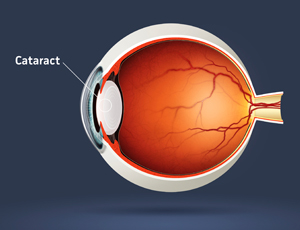Help Prevent Cataracts with Turmeric

Could the antioxidant compounds in turmeric help prevent cataracts? Some studies suggest they can. A cataract makes the lens of the eye opaque. Lenses are mostly made of crystalline protein fibers and enzymes. Excess free radicals break the bonds in the lens fibers. These breaks cause the proteins to clump into opaque spots that replace the normally crystal-clear lens. (viii.62-63)
Did you know cataracts are the leading cause of blindness? Incidence of cataracts generally increases with age, but research suggests healthy habits and nutrients (including turmeric) may delay their formation or progression. (viii.62)
Symptoms of Cataracts
Besides overall reduced vision, the most common symptoms of cataract formation are problems with seeing objects clearly at a distance or sensitivity to glare that interferes with vision. Other symptoms include: (viii.62)
- Blurred and/or double vision.
- Difficulty seeing while driving at night.
- Trouble with depth perception.
Causes and Risk Factors of Cataracts
Trauma and heredity can cause or contribute to cataracts. However, they are typically associated with aging, and decades of accumulated damage to eyes. The good news is that cataracts are not inevitable. Many factors contribute to increased risk of cataract formation, and can be categorized by type: (viii.62, 65, 76-77)
| CATARACT TYPE | CAUSE/RISK FACTOR |
|---|---|
| Senile |
|
| Complicated |
|
| Traumatic |
|
| Congenital |
|
| Toxic |
|
Having diabetes significantly increases the risk of developing cataracts and at a younger age. According to one study, even non-diabetics who have higher than normal fasting blood sugar levels could be facing double the risk of developing a certain type of cataract (as compared to those with normal fasting glucose levels). Other research indicates that the greater length of time a person is diabetic and higher blood sugar levels are both associated with increased risk of cataracts. The link between diabetes and cataract risk may also be exacerbated by UV light. (viii.62, 78-79)
How Can Turmeric Help?
Many of the compounds in turmeric can help counteract the lifestyle and other health factors that can promote cataracts, and may help stop or limit their formation. This includes supporting cardiovascular health, controlling blood sugar levels, and boosting liver function which integrative medicine experts also suggest can also keep eyes healthy. Further studies also show that the anti-aging effects of calorie restriction (CR), which some of the compounds in turmeric mimic, can help delay formation of cataracts. (viii.34, 61-62)
| TURMERIC COMPOUND OR FORM | BENEFICIAL ACTIVITY |
|---|---|
| Alpha-linolenic acid (viii.46) |
|
| Caffeic acid (viii.22) |
|
| Cinnamic acid (viii.22) |
|
| Curcumin (viii.22) |
|
| Ferulic acid (viii.82) |
|
| Myricetin (viii.40) | |
| Niacin (viii.46) |
|
| Protocatechuic acid (viii.39) |
|
| Quercetin (viii.40) | |
| Resveratrol (viii.50) |
|
| Rho-coumaric (viii.22) |
|
| Riboflavin (viii.46) | |
| Thiamine (viii.46) |
|
| Turmeric (whole; dietary) |
|
| Vanillic acid (viii.22) | |
| Vitamin C (viii.46) |
|
| Vitamin E (viii.46) |
|
Join the 1000s of People Who Are Discovering the Benefits of Turmeric.

Healthceuticals® Turmeric Curcumin Complex
100% Certified
Organic ingredients
- Organic Turmeric Extract - standardized to 95% curcuminoids.
- Organic Whole Turmeric - provides full spectrum antioxidant, anti-inflammatory turmeric benefits, including turmerones and numerous vitamins, minerals, and phytonutrients
- Organic Black Pepper Extract - standardized to 95% piperine; dramatically enhances bioavailablity.
- Organic Phospholipids - markedly improve absorption.
- Organic Ginger - works synergistically with turmeric to provide more powerful benefits.
- Absolutely FREE of potentially harmful additives and fillers such as magnesium stearate.



